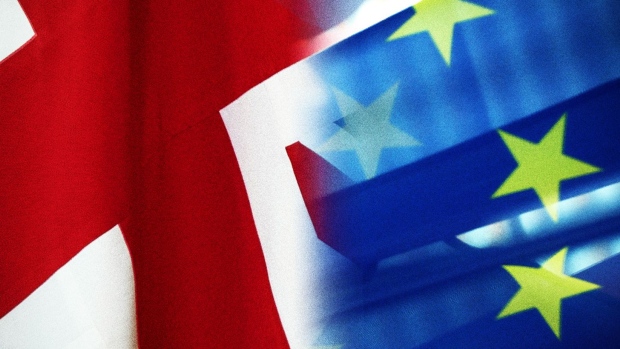Feb 20, 2020
Brexit Bulletin: There’s a Hole in Their Budget
, Bloomberg News

(Bloomberg) --
What’s Happening? The European Union needs to fill a 60 billion euro budget gap caused by Brexit.
Things have become clearer this week. As we’ve reported over the past few days, the battle lines over the future U.K.-EU trading relationship are now clear to see. (Catching up? The U.K. wants to strike out on its own, free of EU rules; the bloc is equally insistent that a meaningful pact requires some regulatory alignment.)
There’s another tussle going on in Brussels, though: the battle over the EU’s next budget. The trillion-euro budget is a complex plan that spans seven years of spending. It needs to provide for agriculture and regional development, as it always has, as well as newer concerns such as climate change and migration.
Read More: EU Leaders Gear Up for Money Clash to Fill Post-Brexit Hole
Yet Britain’s departure leaves a Brexit-shaped hole of at least 60 billion euros ($65 billion). That needs to be plugged by either cutting spending or making others pay more. While it might be a small part of a much larger budget, that in itself points to the scale of the task facing the bloc. The U.K. is gearing up for multiple simultaneous post-Brexit trade talks; by turns the EU faces huge internal challenges as well as its own concerns over relations with China, the U.S. and near neighbors such as Russia and Turkey.
No one seems to be happy, a fact not lost on European Council President Charles Michel as a high-stakes summit got underway on Thursday. Essentially, as Viktoria Dendrinou and Lyubov Pronina report, the EU is split into two basic camps: those who want to spend more, and those who can see they’ll get stuck with the bill. “There are many legitimate concerns,” Michel tweeted. “It will be a tough negotiation,” Swedish Prime Minister Stefan Lofven said.
These internal EU debates are not supposed to impact the post-Brexit talks. But nothing exists in a vacuum. On the eve of the summit EU diplomats were unable to sign off on the bloc’s negotiating position, with France pushing for more demanding conditions on the U.K. A decision is due early next week, but could now be delayed.
Meanwhile, Britain will be watching the tussles in Brussels to see if the EU budget it helped blow up exposes helpful fault lines with the EU’s remaining 27 members.
Beyond Brexit
- Your corporate email isn’t as safe as you think.
- Apple is considering opening up iPhones, iPads and HomePod speakers to rival apps.
- A crop app that started as a tool for coffee producers now aims to save the entire global food supply.
Brexit in Brief
More Work, Fewer People | The U.K.’s new immigration proposals demonstrate how Boris Johnson’s government now only wants highly skilled workers to come to the country. Construction companies say that’s not enough to fulfill big infrastructure projects.
Retail Therapy | U.K. retail sales jumped the most in almost two years in January, adding to signs of an economic rebound after Prime Minister Johnson’s election victory.
Good Times? | British manufacturers are becoming more upbeat, according to the Confederation of British Industry. Meanwhile, the head of the British Chambers of Commerce said the U.K. government should cut the costs of doing business for firms hit by Brexit.
Fiscal Splurge | The bond market seems to approve of Johnson’s fiscal plans—even with billions of pounds of extra spending expected to be unveiled at next month’s budget.
Ties That Bind | The City of London can’t be bullied by Brussels—Europe’s capital markets aren’t strong enough or deep enough, and the EU needs the City as much as the City needs Europe, Marcus Ashworth argues for Bloomberg Opinion.
Bluff Called? | An interesting take in the Telegraph: Under pressure from Britain, the EU has admitted how much it needs a trade deal with Britain, Asa Bennett suggests.
Want to keep up with Brexit?
You can follow us @Brexit on Twitter, and listen to Bloomberg Westminster every weekday.
To contact the author of this story: Adam Blenford in London at ablenford@bloomberg.net
To contact the editor responsible for this story: Chris Kay at ckay5@bloomberg.net
©2020 Bloomberg L.P.